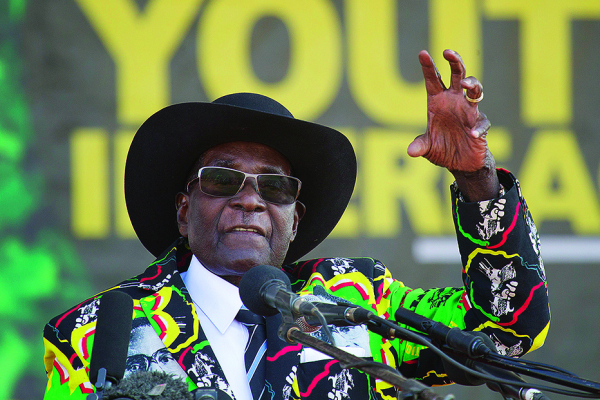
OPPOSITION Zapu leader Dumiso Dabengwa has described 2017 as a watershed year in the history of Zimbabwe with the major highlight being former President Robert Mugabe’s unceremonious departure from the political scene after 37 years in power.
BY SILAS NKALA
Mugabe was forced to resign in November under pressure from the military, citizens and MPs who wanted to impeach him.
In his end of year message, Dabengwa said 2017 would stand out as a year that ended with unprecedented political developments and potential for great social and economic turnaround.
He said there was no guarantee that the end of Mugabe’s 37-year iron grip on power would come so fast and without great loss of life and property, given the Zanu PF regime’s propensity to use force to retain power.
“The people of Zimbabwe therefore rightly rejoiced at the realisation of the slogan “Mugabe must go”: a slogan that reduced a complex system of repression, centralisation and manipulation of power around one man,” Dabengwa said.
He said a Mugabe dynasty was abhorred by many Zimbabweans.
“In hindsight, the tipping point for the accelerated overthrow of Robert Mugabe and his eventual replacement as President by Emmerson Mnangagwa was reached when it became clear that Mugabe wanted to elevate his wife, Grace, to leadership of the ruling Zanu PF women’s league. This positioned her for the slot of vice-president of party and State at the expense of Emmerson Mnangagwa at the expected special party congress,” Dabengwa said.
- Chamisa under fire over US$120K donation
- Mavhunga puts DeMbare into Chibuku quarterfinals
- Pension funds bet on Cabora Bassa oilfields
- Councils defy govt fire tender directive
Keep Reading
The former Zipra intelligence supremo said one of the remarkable developments of 2017 was the growth of co-operation between war veterans’ associations historically divided by alignment to Zapu and to Zanu. He said they opposed political excesses and related economic corruption and unequivocally put these down to departure from the values of the liberation struggle (for independence and freedom).
“The arrogance of the Mugabe regime convinced war veterans that if they stood divided in the face of impunity there was no chance of change. Furthermore this renewed collaboration would facilitate the involvement of all stakeholders in the transition to a democratic and accountable order,” he said.
He said veterans’ associations held a series of meetings and consultations that would culminate in a massive rally on November 18 followed by a march to State House to physically eject Mugabe.
“The threat to army leaders as factional fights in the ruling party intensified made intervention inevitable, resulting in the military’s “Operation Restore Legacy” shortly before the massive demonstration planned for 18 November by the war veterans.
“This popular entry by the army into the crisis created space for Zanu-PF elements to hijack the demonstration and pose as previously “silent” opponents of Mugabe,” Dabengwa said.
He added: “The ensuing veneer of legitimacy and legality provided by a compliant Parliament was then used to bypass the more radical cleansing of the State and to pave way for uncontested perpetuation of Zanu in power, albeit with a military core.”
Dabengwa said excessive power enjoyed by Mugabe had been inherited by Mnangagwa.
“However, this failure to escape the Mugabe past was in some ways inevitable once the emerging change was presented as a Zanu affair backed by the military and other parts of the security sector. Lack of an inclusive agenda meant falling back on the inherited arsenal of Presidential Powers and demonstration of continuity even in making of appointments,” Dabengwa said.
“Significantly, the trend of politicising the military was taken to new heights, with serving officers moving into key political offices without a cooling period. The security sector must not be used as a party political tool and its effectiveness ultimately depends on professionalism and defence of the public interest.”







